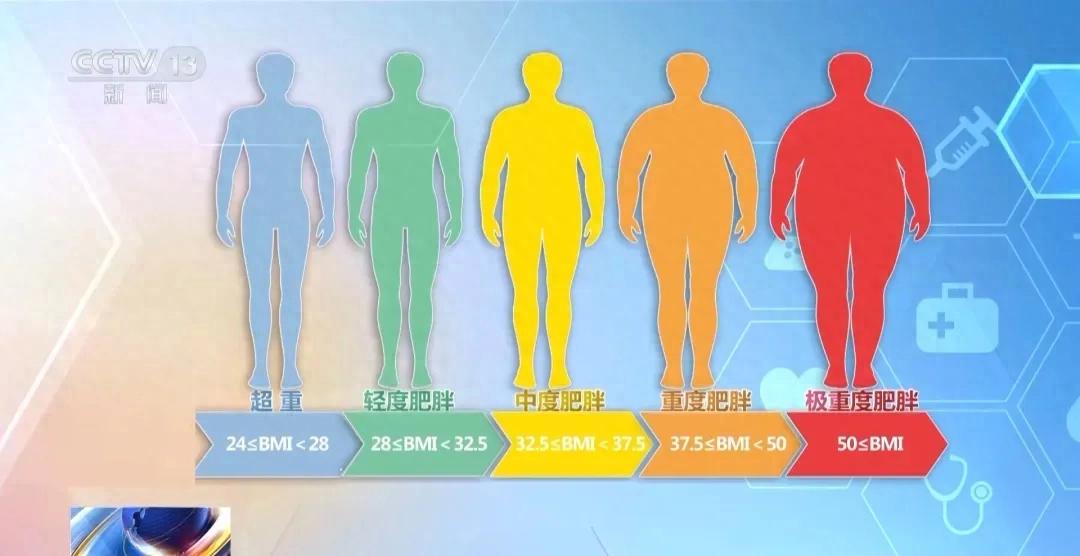Important news
“轻断食”“戒晚餐”“断碳水”,真的管用吗?国家新版减肥指南来了!
Source: Qidian News
Recently, the National Health Commission released a new version of the "Guidelines for Weight Management (2024 Edition)" to the public, providing guidance to the general public and professional doctors on the definition of obesity, intervention and treatment of obesity. How fat is considered fat? How to lose weight more scientifically? Read on to find out↓↓
What are the criteria for determining overweight and obesity?
See which range you fall into
Overweight and obesity are important risk factors for many chronic diseases, including diabetes, hypertension, hyperlipidemia, cardiovascular and cerebrovascular diseases, and certain cancers.
Overweight and obesity are influenced by many factors, including genetics, diet, physical activity level, lifestyle habits, and changes in social environment.
What kind of fat is really overweight or obese? Body mass index (BMI) is a standard for measuring the fatness or thinness of the human body.

BMI = weight (kg) / height (m)²
The normal BMI range for healthy adults in my country is between 18.5 and 24.
A BMI between 24 and 28 is defined as overweight.
Obesity is defined as a BMI of 28 or more. Among them, BMI is further divided into mild obesity, moderate obesity, severe obesity and extremely severe obesity.
"Stop eating" and "move your legs"
There are still many people who don’t know the misunderstandings about weight loss
At present, the generally accepted way to lose weight is to "control your diet". Do "intermittent fasting", "quitting dinner", "cutting carbs" and other weight loss methods really work? The more you exercise, the more you lose weight? How should you lose weight healthily? Take a small notebook and write it down↓↓
Is it scientific to lose weight through excessive dieting?
Medically speaking, nutritional therapy is the basic therapy for comprehensive treatment of obesity, which mainly includes energy-restricted diet, high-protein diet, intermittent fasting, low-carbohydrate diet, etc. Among them, there is the "option" of intermittent fasting. Experts say that intermittent fasting does not mean not eating, and excessive dieting is unscientific.

Zhang Peng, director of the Department of Weight Loss and Metabolic Surgery at Beijing Friendship Hospital, said that a scientific and moderate dieting method is needed to ensure daily intake of protein, unsaturated fatty acids, trace elements, vitamins and water, while controlling calorie intake according to body weight.
"Control your mouth" is not "shut your mouth"! Skipping dinner will not make you lose weight
Experts say that skipping dinner does not actually help you lose weight. If you skip dinner for a long time, the calories from breakfast and lunch will automatically turn into fat, and your weight will increase. Once you resume eating dinner, your weight will rebound very quickly.
Does the carbohydrate-free diet mean not eating staple foods?
The carbon water mentioned here actually refers to carbohydrates. People may usually think that carbohydrates are mainly concentrated in staple foods, but in fact, some ingredients including fruits, vegetables, meat, eggs, etc. also contain carbohydrates.
Experts say that although cutting out carbohydrates can help people lose weight in a short period of time, it is difficult to sustain and will bring some side effects.
Zhang Peng, director of the Department of Weight Loss and Metabolic Surgery at Beijing Friendship Hospital, said that unscientific carbohydrate-free diet can cause harm to the body. For example, brain cells mainly rely on glucose for energy. If carbohydrate-free diet is continued for a long time, insufficient glucose supply to brain cells may lead to memory loss.

Experts suggest that healthy weight loss is not about eating less staple foods, but about eating less "refined" carbohydrates and added sugars.
The more you exercise, the more you lose weight?
Experts say that the human body is an energy balance body. Simply increasing the amount of exercise without controlling the total amount of daily calorie intake will not achieve the goal of weight loss. In addition, excessive exercise can easily lead to muscle fiber damage, increased intermuscular fat, and cause thick limbs.
Exercise to lose weight should be combined with one's own characteristics. Generally, obese people should combine aerobic exercise, anaerobic exercise, flexibility and balance training, and should warm up and adjust themselves in time before and after exercise.
Walking, jogging, swimming, cycling, etc. are "low-medium intensity" aerobic exercises that are suitable for most obese people. Children and middle-aged and elderly people can also practice them.
Mountain climbing, rope skipping, rowing, dancing, etc. are "moderate intensity" aerobic exercises, suitable for young people with good physical strength and no serious chronic diseases. It should be noted that patients with knee osteoarthritis are not suitable for this type of exercise.
Young people with good physical strength, middle-aged and elderly people without serious chronic diseases, and patients with mild to moderate osteoporosis can increase muscle strength through most resistance exercises.
Flexibility and balance training such as Tai Chi, yoga, and Pilates are suitable for most people.
Five drugs approved in my country for the treatment of overweight and obesity
Not suitable for everyone
At present, only five drugs (orlistat, liraglutide, benaglutide, semaglutide and telpotide) have been approved by the National Medical Products Administration for weight loss treatment in adults with primary obesity. Many weight loss "magic drugs" sold online contain banned ingredients such as "sibutramine" and state-controlled "caffeine" and "phentermine", which may be toxic and harmful.
There are corresponding standards for using drugs to lose weight. Only adult patients with a BMI greater than 28 who cannot lose 5% weight after 3 to 6 months of lifestyle intervention, or with a BMI greater than 24 and complications such as hypertension, hyperglycemia, hyperlipidemia, fatty liver disease associated with metabolic dysfunction, weight-related bone and joint diseases, and sleep apnea syndrome can consider adding drug treatment on the basis of comprehensive lifestyle intervention.
In addition, there are side effects of varying degrees when using drugs to lose weight. For example, gastrointestinal discomfort may occur in the early stages of use, mainly manifested as nausea, vomiting, diarrhea, anorexia, and some relatively rare side effects.
Experts say that if you only rely on medication to control your weight, your weight will rebound quickly once you stop taking it.
Source | CCTV.com, CCTV News, People's Daily Online
-
上一篇

In 24 hours, Biden forced China to pay the bill three times, but China refused to compromise. Three
Within 24 hours, the United States has suppressed China thre...
-
下一篇

Why do cherries that traveled across the ocean not go bad? Why do they go bad when I bring them home
Why didn't cherries go bad after almost a month of sea t...
相关文章
- Is Trump’s issuance of currency a way to make money or to “get involved”?
- Can Cao Dewang’s “Stanford dream” come true?
- “Debt repayment”? What debts to be repaid? How to repay?
- 中国“零差评”的8个旅游景点,全部在北京,一生一定要去一次!
- 了不起的中国电动车!雅迪获认央视首期“国潮品牌”
- 中国品牌遍布全球200多个国家和地区——国货潮牌“圈粉”海外市场
- 25亿元卖出“问界”!刚刚,华为回应
- 女律师庭审现场遭法警争夺手机后被推倒,第三方律师称“法警行为并无法律依据”




